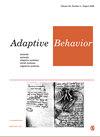Can perception be extended to a “feel of north”? Tests of automaticity with the NaviEar
IF 1.3
4区 计算机科学
Q4 COMPUTER SCIENCE, ARTIFICIAL INTELLIGENCE
引用次数: 2
Abstract
This study investigated the potential for the development of novel perceptual experiences through sustained training with a sensory augmentation device. We developed (1) a new geomagnetic sensory augmentation device, the NaviEar, and (2) a battery of tests for automaticity in the use of the device. The NaviEar translates head direction toward north into continuous sound according to a “wind coding” principle. To facilitate automatization of use, its design is informed by considerations of the embodiment of spatial orientation and multi-sensory integration, and it uses a sensory coding scheme derived from means for auditory perception of wind direction that is common in sailing because it is easy to understand and use. The test battery assesses different effects of automaticity (interference, rigidity of responses, and dynamic integration) assuming that automaticity is a necessary criterion to show the emergence of perceptual feel, that is, an augmented experience with perceptual phenomenal quality. We measured performance in simple training tasks, administered the tests for automaticity, and assessed subjective reports through a questionnaire. Results suggest that the NaviEar is easy and comfortable to use and has a potential for applications in real-world situations. Despite high usability, however, a 5-day training with the NaviEar did not reach levels of automaticity that are indicative of perceptual feel. We propose that the test battery for automaticity may be used as a benchmark test for iterative research on perceptual experiences in sensory augmentation and sensory substitution.感知能延伸到“北方的感觉”吗?NaviEar的自动化测试
本研究探讨了通过持续的感官增强装置训练来发展新的知觉体验的潜力。我们开发了(1)一种新的地磁感官增强装置,NaviEar,以及(2)一组用于使用该装置的自动化测试。根据“风编码”原则,NaviEar将朝向北方的头部方向转换为连续的声音。为了便于使用的自动化,它的设计考虑了空间定向和多感官整合的体现,并使用了一种来自风向听觉感知手段的感官编码方案,这种方法在航海中很常见,因为它易于理解和使用。测试单元评估了自动性的不同影响(干扰、反应刚性和动态整合),假设自动性是显示感知感觉出现的必要标准,即具有感知现象质量的增强体验。我们测量了他们在简单训练任务中的表现,进行了自动性测试,并通过问卷调查评估了主观报告。结果表明,NaviEar使用简单,舒适,具有在现实生活中应用的潜力。尽管具有很高的可用性,但是,使用NaviEar进行的5天训练并没有达到表明感知感觉的自动性水平。我们建议自动性测试单元可以作为感官增强和感官替代中知觉经验迭代研究的基准测试。
本文章由计算机程序翻译,如有差异,请以英文原文为准。
求助全文
约1分钟内获得全文
求助全文
来源期刊

Adaptive Behavior
工程技术-计算机:人工智能
CiteScore
4.30
自引率
18.80%
发文量
34
审稿时长
>12 weeks
期刊介绍:
_Adaptive Behavior_ publishes articles on adaptive behaviour in living organisms and autonomous artificial systems. The official journal of the _International Society of Adaptive Behavior_, _Adaptive Behavior_, addresses topics such as perception and motor control, embodied cognition, learning and evolution, neural mechanisms, artificial intelligence, behavioral sequences, motivation and emotion, characterization of environments, decision making, collective and social behavior, navigation, foraging, communication and signalling.
Print ISSN: 1059-7123
 求助内容:
求助内容: 应助结果提醒方式:
应助结果提醒方式:


